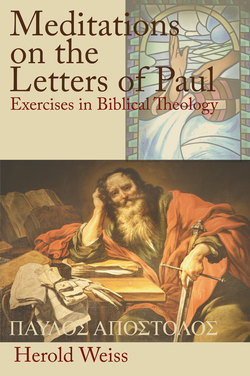Читать книгу Meditations on the Letters of Paul - Herold Weiss - Страница 6
На сайте Литреса книга снята с продажи.
ОглавлениеPreface
My first book, Paul of Tarsus: His Gospel and Life, was published in 1986. The first printing was soon exhausted. That gave me the opportunity to publish an expanded revised edition in 1989. That second edition has been sold out for a number of years. A few years back a friend suggested to me that I should write a new revised edition and offered his help for the project. After giving the matter some consideration I decided not to pursue it. At the time I had other projects that needed my attention.
When I finished writing Meditations on According to John: Exercises in Biblical Theology, I thought I should write a companion volume on the letters of Paul. As I mention in the Preface to According to John, I had wanted to write a book on that gospel for a long time, but I could not come up with the appropriate structure for the book. Once I came up with the format and actually wrote the book, I felt that I had also found the way to give my reading of the letters of Paul a satisfactory new dress. A lot of water has run under the bridge since 1989; therefore, I could no longer use the schema I had used back then. While on some things my mind has remained the same, in some important ways, as I considered the evidence after many years of theological reflection, I have changed my mind.
Around 1999, my colleague at Northern Seminary, Charles Cosgrove, invited me to write with him and K. K. Yeo, a professor at Northwestern University, a book that would look at Paul’s letters from different cultural locations. Since each of us had grown up in a different culture, each wrote a chapter reading Paul in terms of his own culture, and then another chapter from a culture other than his own. The idea was to exhibit the influence of cultures and the difficulties and the rewards of trying to see things in terms of other cultures. The book, Cross-Cultural Paul: Journeys to Others, Journeys to Ourselves, offers six different cultural readings of Paul and draws some conclusions from the exercise. Writing my chapters of that book certainly taught me to pay more attention to Paul’s own culture. That was something I had not paid much attention to in my first book.
My meditations on Paul’s letters are attempts to come to terms with how Paul’s mind works, what are his basic presuppositions, what is peculiarly his when handling issues also considered by others. In this effort I have not been primarily concerned with treating everything he wrote, but to see how what he wrote holds together around central ideas. In my meditations, I have tried to understand Paul in his own terms as well as I possibly can. Hopefully, my struggles with Paul will also bear fruit for others. Trying to understand his struggles with his contemporaries is the best way to gain insights into his fruitful, creative mind. Again, I call these exercises “meditations” because rather than trying to use Paul to construct my version of the Gospel I am trying to come to terms with his Gospel, and that requires to chew slowly and carefully what he wrote in order to get to its core.
As I have pointed out elsewhere, writing is not quite a lonely affair, even if it requires a fair amount of personal concentration. As a writer, I always have with me my audience, even if only in my imagination. Traditionally, “meditations,” be they those of Marcus Aurelius or of Descartes, are attempts to express fundamental things not just for oneself, but with others in mind. The audience is what gives their writing a distinctive tone. Friends of mine have read these meditations as they were written and offered criticism, comments, suggestions and encouragement. At times they have suggested how to say something better, at others they have pointed out the implications or the consequences of my interpretation. I owe a great deal to my Saint Mary’s colleague, Terence Martin. He has been a long-standing friend and effective sound board through the years. His generous observations and suggestions have been most helpful in the writing of this book. Jean and Don Rhoads have again been most selfless with their time and effort to make sure that my writing was clear and in good English. Finally I must thank Henry Neufeld, my publisher, for his encouragement and support. This is the fourth book of mine he is publishing. I am most grateful for his enthusiasm for the project and the professionalism with which he has carried it forward.
The book is dedicated to Roland Loasby, the professor of Greek exegesis of the New Testament who opened my eyes to the advantage and the value of reading what the biblical authors wrote in the original language. All translations are, to a degree, interpretations, even when they aim to stay as close as possible to the original. The paraphrases that have appeared lately are nothing but interpretations with specific agendas. Following the example of professor Loasby, I have been meditating on Paul’s letters with others looking over my shoulders. I offer to them my meditations hoping they consider them invitations to study his letters again.
